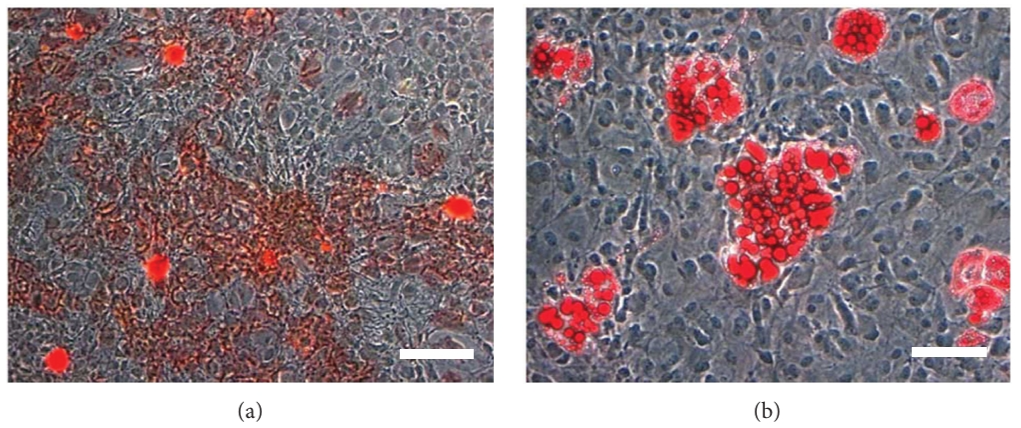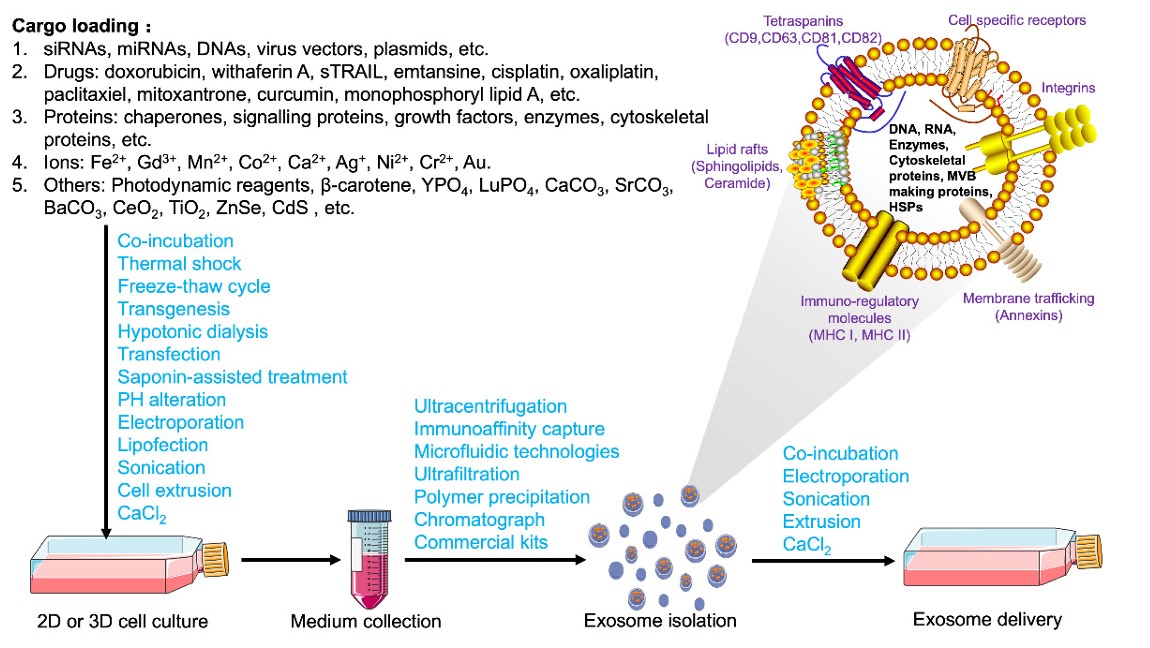Synovial Fluid-Derived Mesenchymal Stem Cells (SF-MSCs)-Targeted Exosome Modification Service
Overview Services Features FAQs
Synovial fluid-derived mesenchymal stem cells (SF-MSCs) are considered to be an available cell treatment for cartilage degenerative lesions in osteoarthritis with applications in cartilage tissue engineering. Exosomes engineered to display targeting peptides on their surface can be used as carriers of regulatory molecules for precise targeting and control of SF-MSCs directed differentiation. Creative Biolabs offers clients flexible engineered exosome modification services for targeting SF-MSCs to advance SF-MSCs research projects based on exosomes.
Overview of SF-MSCs and Their Target-Regulated Directed Differentiation
Retaining their cartilage differentiation and paracrine potential, SF-MSCs are an important source of chondrocytes for cartilage repair. SF-MSCs can be easily obtained by minimally invasive arthrocentesis, of which their potential for growth in vitro is also robust. Thus, SF-MSCs are considered as an available cell therapy for application in cartilage tissue engineering in osteoarthritis. However, similar to the pleiotropic potential of other MSCs, the differentiation of SF-MSCs is also pleiotropic. Possible access to improve the treatment of the strategy in cartilage tissue repair is suggested by controlling the differentiation of SF-MSCs to chondrocytes through the delivery of regulatory molecules. Remarkably, it is crucial to require a delivery system to control the precise delivery and release in targeted SF-MSCs.
 Fig. 1 Multipotent differentiation potential of SF-MSCs for osteogenesis and adipogenesis.1
Fig. 1 Multipotent differentiation potential of SF-MSCs for osteogenesis and adipogenesis.1
Exosome Modifications Targeting the SF-MSCs at Creative Biolabs
Creative Biolabs offers strategies to modify exosomal surface protein fractions to achieve specific targeting to SF-MSCs, thus circumventing negative delivery effects such as their being metabolized and stoichiometry. Specifically, an E7 peptide (EPLQLKM) with proven potential for targeting SF-MSCs was screened using phage-based display technology and linked to exosomal membrane proteins such as Lamp2b, thus completing the modification of exosomes capable of targeting SF-MSCs. This modification can be achieved not only by direct sexual attachment to exosomal membrane proteins, but also by constructing cell lines transfected with Lamp2b-E7 fusion plasmids to obtain engineered exosomes. Furthermore, this E7-modified engineered exosome modification strategy has been shown to adequately improve the targeting superiority of exosome vectors in both cellular and rat models of bone disease.
 Fig. 2 Cargo loading, isolation, and delivery strategies for engineered exosomes.2
Fig. 2 Cargo loading, isolation, and delivery strategies for engineered exosomes.2
We provide construction services for specified cell lines containing E7 fusion plasmids to ensure stable expression of E7 peptides during exosome production. The collected cell supernatant of the engineered exosomes can then be scaled up and purified in our exosome production platform, leading to a high yield of E7-modified exosomes. Utilizing our exosome cargo delivery platform enables cargo loading into E7-modified exosomes, including modulating drugs and molecules. This E7-modified engineered exosome modification strategy has been shown to sufficiently improve the targeting superiority of exosome carriers in cellular and rat models of bone disease, which is investigated by functional assays to detect changes in SF-MSCs after exosome administration.
Features
-
Cutting-Edge Technology: Our service harnesses the latest advancements in biotechnology to modify exosomes specifically targeting SF-MSCs.
-
Tailored Solutions: We customize exosome modifications to suit the unique characteristics and requirements of SF-MSCs, ensuring optimal efficacy and compatibility.
-
Enhanced Potential: By precisely engineering exosomes to target SF-MSCs, we maximize their impact, facilitating more effective tissue repair and regeneration.
-
Accelerated Research: With our SF-MSCs-targeted exosome modification service, researchers can expedite their investigations into regenerative medicine, accelerating breakthroughs in the field.
FAQs
Q: What are Synovial Fluid-Derived Mesenchymal Stem Cells (SF-MSCs)?
A: SF-MSCs are a type of mesenchymal stem cells sourced from synovial fluid, the lubricating fluid found in joints. These cells possess remarkable regenerative potential and have garnered significant interest in tissue engineering and regenerative medicine due to their ability to differentiate into various cell types.
Q: What are the potential applications of SF-MSCs-targeted exosome modification?
A: This technology holds promise for a wide range of therapeutic applications, including but not limited to the treatment of osteoarthritis, rheumatoid arthritis, tendon injuries, and cartilage defects. By harnessing the regenerative properties of SF-MSCs and the targeted delivery capabilities of exosomes, researchers aim to develop innovative therapies for various musculoskeletal disorders.
Q: Is this service suitable for clinical applications?
A: While SF-MSCs-targeted exosome modification shows immense potential for clinical translation, further research and development are necessary to ensure safety, efficacy, and regulatory compliance. Our service primarily caters to researchers conducting preclinical studies and exploring the therapeutic potential of this technology.
Creative Biolabs provides exosome modification strategies based on the modification of surface protein fractions to achieve specific targeting to SF-MSCs, facilitating the application of SF-MSCs in the treatment of bone-related disorders. Our talented team is pleased to provide high-quality customized research services to meet your needs. Please feel free to contact us to create a custom quote.
References
-
Jorgenson, Kristen D., et al. "Production of adult human synovial fluid-derived mesenchymal stem cells in stirred-suspension culture." Stem Cells International 2018 (2018). Under Open Access license CC BY 4.0. The image was modified by extracting and using only Part A and B of the original image, and revising the title.
-
Fan, Yishu, Zhong Li, and Yuchen He. "Exosomes in the pathogenesis, progression, and treatment of osteoarthritis." Bioengineering 9.3 (2022): 99. Under Open Access license CC BY 4.0. The image was modified by revising the title.
For Research Use Only. Cannot be used by patients.
Related Services:

 Fig. 1 Multipotent differentiation potential of SF-MSCs for osteogenesis and adipogenesis.1
Fig. 1 Multipotent differentiation potential of SF-MSCs for osteogenesis and adipogenesis.1
 Fig. 2 Cargo loading, isolation, and delivery strategies for engineered exosomes.2
Fig. 2 Cargo loading, isolation, and delivery strategies for engineered exosomes.2









